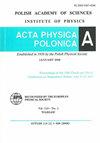从局部纳米空隙率看某些润滑剂的动态粘度
IF 0.5
4区 物理与天体物理
Q4 PHYSICS, MULTIDISCIPLINARY
引用次数: 0
摘要
本文章由计算机程序翻译,如有差异,请以英文原文为准。
Dynamic Viscosity of Some Lubricants in Terms of Local Nano-Void Fraction
In the current study, the dynamic viscosity has been established by the preceding viscosity correlation equation in terms of thermo-occupancy function, Y h = Y h ( h, T ) , for three types of chemically differ-ent pure substances between 283.15–398.15 K and up to 100 MPa. The thermo-occupancy function, Y h = Y h ( h, T ) , comprises temperature T and hole (nano-void) fraction h = h ( P, T ) estimated by the Simha–Somcynsky equation of state through the published density data. The density fitting results were found by this report to be from 0.026 to 0.051%. The predictive dynamic viscosity of dialkyl carbonates, ethylene glycol dimethyl ethers, and di(2-ethylhexyl) sebacate was obtained with an overall uncertainty of 0.29%, 0.40%, and 0.38%, respectively. The effects of the optimized volumetric and rheological parameters on the compounds’ molecular structure and architecture were investigated. The increase in fraction h with an increasing temperature suggests a decrease in the rate of change in dynamic viscosity (viscoholibility) of the samples over a computed hole fraction range.
求助全文
通过发布文献求助,成功后即可免费获取论文全文。
去求助
来源期刊

Acta Physica Polonica A
物理-物理:综合
CiteScore
1.50
自引率
0.00%
发文量
141
审稿时长
6 months
期刊介绍:
Contributions which report original research results
and reviews in the fields of General Physics, Atomic and
Molecular Physics, Optics and Quantum Optics, Quantum Information, Biophysics, Condensed Matter, and
Applied Physics are welcomed.
 求助内容:
求助内容: 应助结果提醒方式:
应助结果提醒方式:


